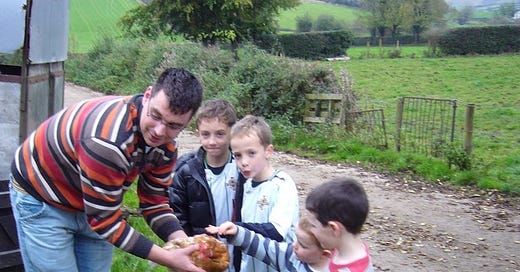I pillage an old draft my friend never removed my access to, of a project he never completed, or even started:
“I think of the words said about Edna O’Brien: ‘novels of heart-breaking empathy, rigorous honesty and peerless beauty.’ These are novels of technical brilliance, dazzling humour, and above all, endless humanity.”
Edna O’Brien, whose Country Girls trilogy was burned on its arrival in 1960, is dead at 93, having died ‘peacefully’ after a long illness. The Country Girls books tell of a girl leaving rural Ireland for school, then Dublin, then London. It’s worth repeating that the Irish word for emigrant, ‘deoraí’, means ‘one who has shed tears’. Kate wishes “that Mama was in heaven, that my father would never drink again, and that Mr. Gentleman [love interest] would not forget to come at one o’clock.”
O’Brien wrote the first book after moving to London and following an ad for a lecture on Fitzgerald and Hemingway. The writing took her, famously, 27 days.
Fitzgerald’s magnificent, concussive impulse to romance finds voice in O’Brien. In one of the great sentences ever, “The city seen from the Queensboro Bridge is always the city seen for the first time, in its first wild promise of all the mystery and the beauty in the world.” Characters in Country Girls want “to live. Drink gin. Squeeze into the front of big cars and drive up outside big hotels.” They are “restless for crowds and lights and noise.”, with “longings, for songs, cigarettes, dark bars, telegrams, cacti, combs in your hair, the circus, nights out, life.” They feel they must:
“Get out of this dive—be something—somebody. An actor, something exciting.”
The Hemingway lift is of style rather than spirit, and feels underdigested. There are a lot of sentences like “My arms were thin and white and I was ashamed of them.” Everyone treats the rapid composition as a virtue, but I think it probably harmed the text. The lecturer read the first paragraph of A Farewell to Arms, but nothing in Country Girls has the careful art as that opening.
The book’s outrageous contemporaries – Sylvia Plath’s The Bell Jar, Philip Roth’s Portnoy’s Complaint – have better claims to genius. But The Country Girls came out three and nine years before those. A man’s sly handshake producing “an odd sensation, as if someone were tickling my stomach from the inside” may not shock now, but it shocked in its time.
I opened with that swipe at my friend because the big fact is that O’Brien did what she did. She acted to be something, something exciting. The inexpressive, self-denying mother is after she drowns “more dead than anyone I had ever heard of.” O’Brien’s work came out and will stay out. She “had only to say the words in order to feel it, blue, precious, enchanting … my deathless, deathless song.”
GM





